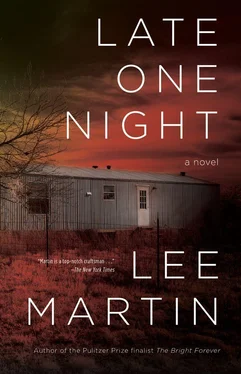“Sugar, you’ve got to think about what you want on down the road.” She went to him and slipped her arms around his waist. “Maybe now’s not the time to make waves.”
The two of them hadn’t talked about that, hadn’t said a word about how the life they’d been planning would now jostle up against the hard facts of the fire. All fall and winter, Ronnie had been busy imagining his new life with Brandi and the baby. Not that he thought he’d make a clean break from Della and the kids — not that he even wanted to. Maybe he’d have the kids a few at a time. An afternoon here, a weekend there, maybe even a week during the summer or at the holidays, before they went back to their trailer along the blacktop.
But things were different now. Della was gone, and the girls who’d survived the fire were waiting to see where they’d land.
Ronnie said, “They’re my girls.” He studied Brandi’s face, tried to figure out how what he was about to say would affect her. Then, all of a sudden, he knew, and with the knowing came a great peace. She was looking at him, and he could tell that he could say what was in his heart and she’d accept it without question. “I want them to come live with us.”
Brandi nodded. “All right, then.” She kissed his cheek. “You ready?”
“I’m ready,” he said.
She took his hand. “Let’s go home, and let’s not come back here until it’s time for the baby to be born. Deal?”
“Deal,” he said, and he knew, then, he wouldn’t file charges against Wayne. He’d keep things nice and easy. He’d go get his girls, and Brandi would be right there beside him, no matter what people thought about that. They were a couple, and those girls were his children, and together he and Brandi would give them a good home. That’s the story he told himself as the two of them stepped out of the hospital into the cold, into a sun so bright it hurt his eyes, and he had to squint so he could see where he was going.
The visitation would be on Tuesday evening. In the days since the fire, folks from Goldengate had driven out the blacktop to get a look at the trailer. Car after car. Rubberneckers, Shooter Rowe called them, when a reporter from the television station up in Terre Haute came on Saturday and started asking questions. “Goddamn rubberneckers,” Shooter said. “Busybodies who can’t keep their eyes on their own business.” The charred mess was nothing anyone would recognize as ever having been a home. Just a pile of smoldering debris, soggy from the pumper’s dousing, only the hunks of the furnace and the hot water heater still standing to make any sign at all that a woman and her seven kids had lain down on their beds there the night before and gone to sleep. “Put that in your story,” Shooter told the reporter. “People no better than turkey buzzards feeding off the dead. They’ve got no business out here.”
They kept coming, people who’d known Della and her kids and people who hadn’t. They came to lay flowers, teddy bears, and cards at what was left of the front step of the trailer. Someone tied four helium-filled balloons — red, yellow, blue, and green — to a low branch of the cedar tree at the corner of the goat shed. The heat from the fire had scorched the needles from the cedar and the branches were bare, the bark blistered and peeling in places. People came to bring the flowers and teddy bears and cards and balloons because they wanted to do something. A fire truck was still there, a hose run through the field to the pond where they’d had to chop through the ice to get water once the tanker ran dry. The Red Cross workers who’d been there most of the night had gone, leaving behind a litter of crushed coffee cups on the frozen ground.
Shooter knew that some people came because they’d been acquainted with Della and her kids from church, or school activities, or 4-H. He knew they came because they didn’t know what else to do. He tried to make allowances for the ones like Laverne Ott. He saw her car pulled off the side of the blacktop in front of what was left of the trailer, and he let her sit there a good long while, left her to her grief until finally he started to worry. He came outside and crossed the blacktop. He tapped on her window and she pushed the button to power it down. Her glasses were crooked on her face.
“Oh, Carl,” she said, using his given name. “My god.”
“I know, Laverne,” he said. “It just tears my heart.”
“What it must have been like here last night.”
He could have told her about the blaze and the sounds — the roar of the flames, the breaking of glass, the crackling of the vinyl and plastic, the popping of aerosol cans exploding. He could have told her about the cries he heard from the children and how there came a time when they stopped, and how that was the worst sound of all: the absence of anything human. He wouldn’t tell her how the volunteer firefighters found Della holding the baby, with Gracie and Emily huddled up close to her. He wouldn’t say that there’d been so little of them left that the coroner’s deputies brought them all out in the same body bag. He’d spare Laverne Ott all that.
“It’s nothing I want to talk about,” he said. “Not ever.”
He wouldn’t tell her that around nine o’clock the night of the fire, Captain got all worked up over Della’s goats, worried that the patch job Shooter had done on the pen wouldn’t hold.
“It’s not our job to see to those goats,” Shooter told him, but Captain wouldn’t leave it alone. If they didn’t look out for Della, who would?
“We’ve got ourselves to look out for,” Shooter had said, and he meant it. There he was alone with Captain to see to, and wasn’t that enough without having to see to another man’s wife and kids? Was it any wonder that Shooter got his back up each time those goats got out? A man should keep himself to his duty — if he’s any kind of man at all.
“It’s Ronnie’s job,” Shooter told Captain. “It’s his place, but he’s not man enough to know it. Don’t you ever be like him, Wesley. I swear. He’s not worth a damn.”
That was the worst thing he could have said — and Shooter knew that as soon as the words were out of the mouth.
“Don’t you talk about Ronnie like that.” Captain balled his hands up into fists. “I mean it. Don’t.”
Shooter latched onto his arm. “Someday you’ll know what I’m saying is true. It’s just too much for you to understand now.”
Captain broke free. “I’m not stupid.”
“I’m not saying you are.”
“You think I’m a retard.” Captain turned and stomped into his room. He slammed the door, and Shooter heard the lock click, and then Captain’s voice, more distant from the other side of the locked door. “You think I don’t listen.”
Shooter tried to tell him that wasn’t true. He told him, as he always did, that he was a special gift from God. A boy with a good heart. “But damn it, Wesley. Sometimes you’ve got to know that goodness only carries you so far in the world. There are people — and Ronnie is one of them — who don’t mind stomping on someone just to get what he wants. You need to know there are people like him.”
Captain wouldn’t say a word, and finally Shooter gave up. He brooded awhile in his reclining chair. Then he turned on the television and tried to get interested in an old John Wayne movie. After a time he dozed off and when he woke up it was ten o’clock and the movie was over.
He got to stewing then, recalling how Della had spoken so sharply to him that afternoon. Who did she think she was? The more he thought about it, the angrier he got. He’d been trying to do nothing but a good turn for her ever since Ronnie left, and then for her to snap at him like that. By god, he didn’t regret for a second what he’d told Missy. He would like Della and her mob much better if only they lived somewhere else.
Читать дальше












